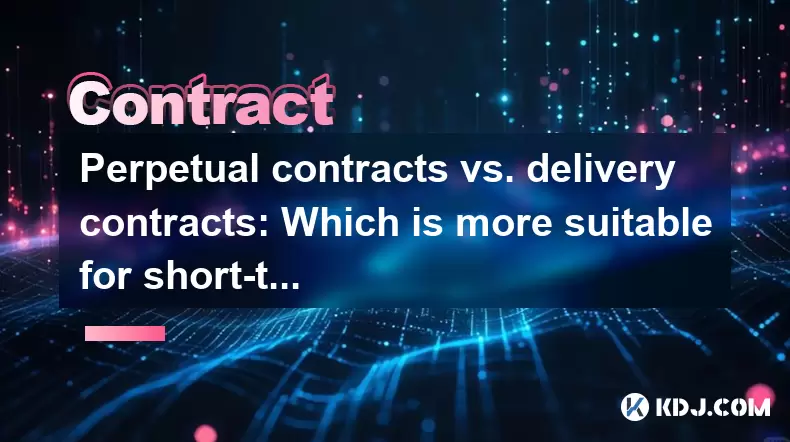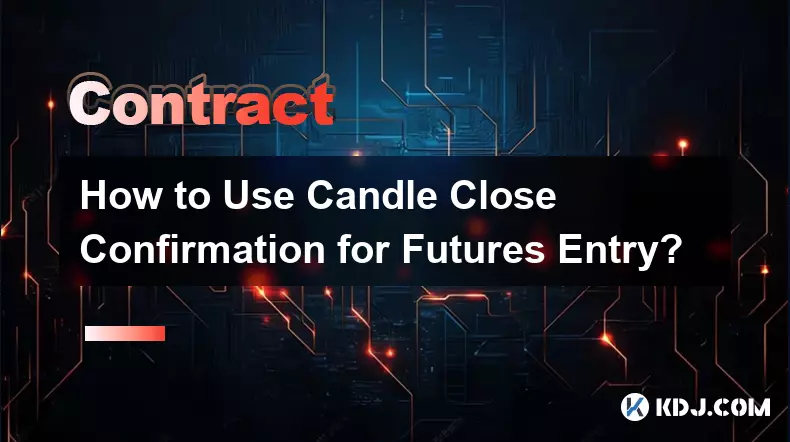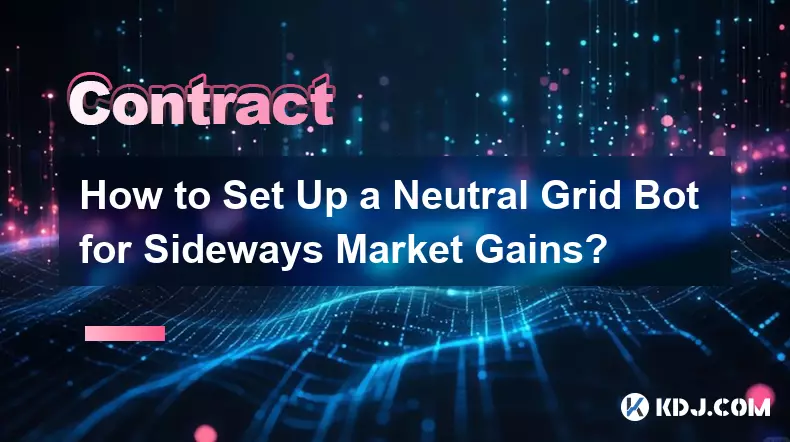-
 bitcoin
bitcoin $87959.907984 USD
1.34% -
 ethereum
ethereum $2920.497338 USD
3.04% -
 tether
tether $0.999775 USD
0.00% -
 xrp
xrp $2.237324 USD
8.12% -
 bnb
bnb $860.243768 USD
0.90% -
 solana
solana $138.089498 USD
5.43% -
 usd-coin
usd-coin $0.999807 USD
0.01% -
 tron
tron $0.272801 USD
-1.53% -
 dogecoin
dogecoin $0.150904 USD
2.96% -
 cardano
cardano $0.421635 USD
1.97% -
 hyperliquid
hyperliquid $32.152445 USD
2.23% -
 bitcoin-cash
bitcoin-cash $533.301069 USD
-1.94% -
 chainlink
chainlink $12.953417 USD
2.68% -
 unus-sed-leo
unus-sed-leo $9.535951 USD
0.73% -
 zcash
zcash $521.483386 USD
-2.87%
Perpetual contracts vs. delivery contracts: Which is more suitable for short-term trading?
Perpetual contracts offer flexibility with no expiry, while delivery contracts settle in the underlying asset on a fixed date, each impacting trading strategies differently.
Jun 18, 2025 at 02:07 pm

Understanding the Basics of Perpetual and Delivery Contracts
In the world of cryptocurrency trading, perpetual contracts and delivery contracts are two primary types of futures instruments available to traders. Each has its unique characteristics that make it suitable for different trading strategies. Perpetual contracts do not have an expiration date, allowing traders to hold positions indefinitely as long as they can cover funding fees. On the other hand, delivery contracts come with a fixed settlement date, after which the contract is settled in the underlying asset.
For short-term traders, understanding these foundational differences is crucial. The absence of an expiration date in perpetual contracts offers flexibility, while delivery contracts require traders to manage time decay and rollover costs more carefully.
Trading Mechanics: How Perpetual Contracts Work
Perpetual contracts mimic spot markets but allow for leveraged trading. Since there’s no expiry, traders can maintain open positions for extended periods. However, funding rates play a significant role in this mechanism. These rates are exchanged between long and short traders at regular intervals (usually every 8 hours) to ensure the price of the perpetual contract stays close to the spot price.
- Funding rates can be positive or negative.
- Traders holding long positions may pay or receive funds depending on the rate.
- Short position holders experience the same dynamic in reverse.
This system allows perpetual contracts to remain closely tied to the actual market price of the asset. For short-term traders, especially those who trade intraday or swing within a few days, the impact of funding fees might be minimal, making perpetual contracts attractive.
How Delivery Contracts Operate in Crypto Futures Trading
Unlike perpetual contracts, delivery contracts have a defined maturity date. Upon expiration, the contract settles based on the average price over a specific period, often called the index price. This settlement process means traders must either roll their positions into a new contract or accept delivery of the underlying asset.
- Delivery contracts are influenced by contango (when future prices are higher than spot prices) and backwardation (when future prices are lower).
- As the expiry approaches, the contract price converges with the spot price.
- Rolling positions involves transaction costs and potential slippage.
For short-term traders, managing the timing of expiry and rollover becomes essential when using delivery contracts. If a trader enters a position too close to expiry, they may face increased volatility and liquidity issues.
Leverage and Margin Considerations in Both Contract Types
Leverage plays a critical role in futures trading, and both perpetual and delivery contracts offer varying degrees of leverage. Most exchanges provide up to 100x leverage for perpetual contracts, which can amplify both gains and losses. Margin requirements differ slightly between the two:
- Perpetual contracts typically use cross margin or isolated margin systems.
- Delivery contracts may also support similar margin structures, but rollover affects capital efficiency.
Short-term traders benefit from high leverage, but they must monitor liquidation levels closely. In volatile markets, even small price swings can trigger liquidation if the margin is insufficient. Perpetual contracts allow traders to adjust positions without worrying about expiry, while delivery contracts require strategic planning around margin usage and rollover dates.
Volatility and Liquidity Differences Between the Two Contracts
Market conditions significantly affect trading outcomes, especially for short-term strategies. Perpetual contracts generally exhibit higher liquidity due to their continuous nature, attracting more traders and volume. High liquidity ensures tighter spreads and smoother entry/exit points.
- Delivery contracts may suffer from reduced liquidity as expiry nears.
- Perpetual contracts maintain consistent liquidity across timeframes.
- Volatility spikes are more manageable in perpetual contracts due to constant pricing mechanisms.
Traders focusing on scalping or day trading prefer instruments with tight spreads and rapid execution. In such cases, perpetual contracts tend to outperform delivery contracts in terms of usability and responsiveness during fast-moving market conditions.
Risk Management Strategies for Short-Term Futures Traders
Risk management is vital regardless of the contract type chosen. However, certain aspects differ between perpetual and delivery contracts. Stop-loss orders function differently in each environment:
- In perpetual contracts, stop-losses must account for funding fees and potential slippage.
- Delivery contracts may see erratic price movements near expiry, affecting order execution.
Additionally, traders should consider position sizing and margin allocation carefully. Over-leveraging in either contract type increases exposure to sudden market shifts. For short-term traders, setting realistic profit targets and using trailing stops can help lock in gains without overextending risk.
Frequently Asked Questions
Q: Can I switch between perpetual and delivery contracts mid-trade?Yes, traders can close a position in one contract type and open a new one in another. However, doing so may incur additional fees and expose traders to market gaps during the transition.
Q: Are funding rates always applied in perpetual contracts?Yes, funding fees are charged regularly (typically every 8 hours) to maintain price alignment with the spot market. These fees vary based on market conditions and exchange policies.
Q: Do delivery contracts settle automatically upon expiry?Yes, most platforms automatically settle delivery contracts based on the index price at expiry. Traders holding positions until settlement will receive the underlying asset unless they close the position beforehand.
Q: Which contract type is better for scalping strategies?Perpetual contracts are generally preferred for scalping due to higher liquidity, tighter spreads, and no expiry-related complications.
Disclaimer:info@kdj.com
The information provided is not trading advice. kdj.com does not assume any responsibility for any investments made based on the information provided in this article. Cryptocurrencies are highly volatile and it is highly recommended that you invest with caution after thorough research!
If you believe that the content used on this website infringes your copyright, please contact us immediately (info@kdj.com) and we will delete it promptly.
- NYC Reacts: Bitcoin Price Sees Sharp BTC Fall, Fueling Market Uncertainty
- 2026-02-06 13:20:01
- CME Coin Ignites Wall Street's Tokenized Finance Revolution: A New Era Dawns
- 2026-02-06 13:20:01
- Bitcoin Price, BTC Level, USD Now: Navigating Today's Volatile Crypto Landscape
- 2026-02-06 13:15:01
- Bitcoin's Big Apple Rollercoaster: Live Market Tumbles, USD Value in Flux
- 2026-02-06 13:15:01
- Iris Energy and the Bitcoin Mining Maze: A Q4 Revenue Shortfall Signals Industry Headwinds
- 2026-02-06 13:10:02
- Crypto's Chilly Reception: Bitcoin Plunge Pinches Iren's Pockets as AI Heats Up
- 2026-02-06 12:50:02
Related knowledge

How to Manage Emotions and "Revenge Trading" in Futures?
Feb 05,2026 at 12:19am
Understanding Emotional Triggers in Futures Markets1. Market volatility directly impacts psychological states, often amplifying fear or euphoria based...

How to Use Candle Close Confirmation for Futures Entry?
Feb 05,2026 at 04:20pm
Understanding Candle Close Confirmation1. A candle close confirmation occurs when the final price of a candlestick settles beyond a predefined level, ...

How to Master "Position Sizing" to Prevent Total Account Wipeout?
Feb 06,2026 at 12:00am
Market Volatility Patterns1. Bitcoin price swings often exceed 10% within a 24-hour window during high-liquidity events such as ETF approval announcem...

How to Analyze Market Sentiment Using the Fear and Greed Index?
Feb 05,2026 at 07:40am
Understanding the Fear and Greed Index1. The Fear and Greed Index is a composite metric designed to quantify prevailing emotional states among cryptoc...

How to Secure Your Futures Account with Anti-Phishing Codes?
Feb 05,2026 at 08:40pm
Understanding Anti-Phishing Codes in Crypto Futures Trading1. Anti-phishing codes are unique alphanumeric strings generated by futures exchanges to au...

How to Set Up a Neutral Grid Bot for Sideways Market Gains?
Feb 06,2026 at 10:00am
Understanding Neutral Grid Bot Mechanics1. A neutral grid bot operates without directional bias, placing buy and sell orders at predetermined price in...

How to Manage Emotions and "Revenge Trading" in Futures?
Feb 05,2026 at 12:19am
Understanding Emotional Triggers in Futures Markets1. Market volatility directly impacts psychological states, often amplifying fear or euphoria based...

How to Use Candle Close Confirmation for Futures Entry?
Feb 05,2026 at 04:20pm
Understanding Candle Close Confirmation1. A candle close confirmation occurs when the final price of a candlestick settles beyond a predefined level, ...

How to Master "Position Sizing" to Prevent Total Account Wipeout?
Feb 06,2026 at 12:00am
Market Volatility Patterns1. Bitcoin price swings often exceed 10% within a 24-hour window during high-liquidity events such as ETF approval announcem...

How to Analyze Market Sentiment Using the Fear and Greed Index?
Feb 05,2026 at 07:40am
Understanding the Fear and Greed Index1. The Fear and Greed Index is a composite metric designed to quantify prevailing emotional states among cryptoc...

How to Secure Your Futures Account with Anti-Phishing Codes?
Feb 05,2026 at 08:40pm
Understanding Anti-Phishing Codes in Crypto Futures Trading1. Anti-phishing codes are unique alphanumeric strings generated by futures exchanges to au...

How to Set Up a Neutral Grid Bot for Sideways Market Gains?
Feb 06,2026 at 10:00am
Understanding Neutral Grid Bot Mechanics1. A neutral grid bot operates without directional bias, placing buy and sell orders at predetermined price in...
See all articles










































































